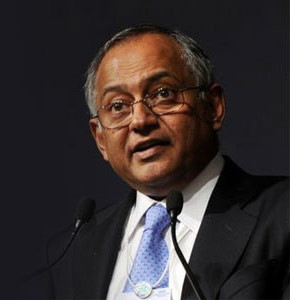The Small Shift for the Big Change

Managing Trustee
Twenty years ago when we set up SST, we were not quite sure how our social work would shape up. Our premise was centred around the guiding values of the group — of maintaining Trust, building Value and to be of Service to the community. We wanted to be enablers of sustainable development. And we knew we had to find a scaleable model, because the numbers of the dispossessed are so vast.
To get there, we decided to apply some of what we knew really well. For us, it was what had helped our workplace be best in class, a process called Total Quality Management.
In our businesses, we begin by identifying and eliminating slack and wastage in all processes. We then move on to improve productivity and quality in every aspect of the business, from design to manufacturing to sales, service and most importantly human resources.
Once workflow becomes process-driven, people see the gains. This in turn brings about a change in attitude. They then get habituated to continual improvement as a way of life.
At SST, our social workers apply the same principles to the management of villages. They live in villages, work with the local community to identify problems and co-create solutions utilising available resources.
In the village microcosm, this means very simple things such as as getting home-makers to take up income-generating work, or connecting farmers to useful government programs. It involves making sure the health worker in a village has usable infrastructure, or that rainwater harvesting saves water for the dry months. In the same way we improve our business — we cover all aspects of village life to create holistic development.
The result then, is that women form self-help groups, making them more empowered and independent. Farmers prosper and lead by example. Children complete school, higher education and get a shot at a professional career. And an entire generation grows up to a new way of life.
This development-led model breaks down traditional barriers of caste, and income-equality creates new kinds of leadership. In SST’s villages, the community takes charge of the change it wants to make and works to make it happen.
As much as 70 percent of our funds are spent on human development and only the remainder on improving infrastructure. We also work very closely with governments to ensure that public programs reach the people they are meant for. That brings me back to our core value of maintaining Trust and building Value and Service.
In all of this we have learnt a great many things, the most important of which is that throwing money at social development isn’t the solution, that too in a poor country. Money is important to a lot of what we do, but it’s not really what gets the job done.
Companies must remember meaningful change comes from leadership of thought, the pursuit of holistic development and a quality-driven process to see it through. And patience is most critical.
The transformation in SST’s communities is reciprocal, involved and dynamic.
My hope, as we keep expanding our footprint of villages, is that our work will inspire other business groups to explore our program of scaleable, sustainable development for those who need it the most. We will gladly share our model with anyone who believes that this is the pivot of their social program.
In the next stage of our journey, we would also like innovators to work with our communities and create low-cost, environment-friendly solutions that will help better the lives of millions of marginalised Indians. These innovations will lead to new business opportunities which can become national, or even go global. We see it as the small shift for the big change.

